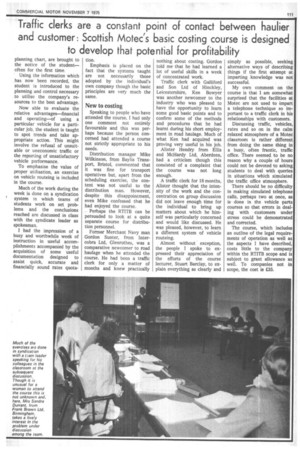Traffic clerks are a constant point of contact between haulier
Page 113

If you've noticed an error in this article please click here to report it so we can fix it.
and customer: Scottish Motec's basic costing course is designed to develop that potential for profitability
planning chart, are brought to the notice of the student— often for the first time.
Using the information which has now been recorded, the student is introduced to the planning and control necessary to utilise the company's resources to the best advantage.
Now able to evaluate the relative advantages—financial and operating—of using a particular vehicle for a particular job, the student is taught to spot trends and take appropriate action. This might involve the refusal of unsuitable or uneconomic traffic or the reporting of unsatisfactory vehicle performance.
To emphasise the value of proper utilisation, an exercise on vehicle routeing is included in the course.
Much of the work during the week is done an a syndication system in which teams of students work on set problems and the conclusions reached are discussed in class with the syndicate leader as spokesman.
1 had the impression of a busy and worthwhile week of instruction in useful accomplishments accompanied by the acquisition of some useful documentation designed to assist quick, accurate and financially sound rates quota tion.
Emphasis is placed on the fact that the• systems taught are not necessarily those adopted by the individual's own company though the basic principles are very much the same.
New to costing
Speaking to people who have attended the course, I had only one comment not entirely favourable and this was perhaps because the person concerned had attended a course not strictly appropriate to his needs.
Distribution manager Mike Wilkinson, from Baylis Transport, Bristol, commented that it was fine for transport operatives but, apart from the scheduling exercise, the content was not useful to the distribution man. However, despite this disappointment, even Mike confessed that he had enjoyed the course.
Perhaps the RTITB can be persuaded to look at a quite separate course for distribution personnel.
Former Merchant Navy man Gordon Sunter, from Intercobra Ltd, Glenrothes, was •a comparative newcomer to road haulage when he attended the course. He had been a traffic clerk for only a matter of months and knew practically nothing about costing. Gordon told me that he had learned a lot of useful skills in a week of concentrated work.
Traffic clerk with Galliford and Son Ltd of Hinckley, Leicestershire, Ken Bowyer was another newcomer to the industry who was pleased to have the opportunity to learn some good basic points and to confirm some of the methods and procedures that he had learnt during his short employment in road haulage. Much of what Ken had acquired was proving very useful in his job.
Alister Hendry from Ellis and McHardy Ltd, Aberdeen, had a criticism though this consisted of a complaint that the course was not long enough.
A traffic clerk for 18 months, Alister thought that the intensity of the work and the concentration on group discussion did not leave enough time for the individual to bring up matters about which he himself was particularly concerned and would like discussed. He was pleased, however, to learn a different system of vehicle routeing.
Almost without exception, the people I spoke to expressed their appreciation of the efforts of the course lecturer, Stuart Barclay, to explain everything as clearly and simply as possible, seeking alternative ways of describing things if the first attempt at imparting knowledge was not successful.
My own comment on the course is that I am somewhat surprised that the facilities at Matec are rick used to impart a telephone technique so important to a traffic clerk in his relationships with customers.
Discussing traffic, vehicles, rates and so on in the calm relaxed atmosphere of a Motec classroom is rather different from doing the same thing in a busy, often frantic, traffic office. There seemed to be no reason why a couple of hours could not be devoted to asking students to deal with queries in situations which simulated the traffic office atmosphere.
There should be no difficulty • in making simulated telephone calls, perhaps two at once, as is done in the vehicle parts courses so that errors in dealing with customers under stress could be demonstrated and corrected.
The course, which includes an outline of the legal requirements of operation as well as the aspects I have described, costs little to the company within the RTIT13 scope and is subject to grant allowance •as well. To companies not in scope, the cost is £35.
















































































































































































































